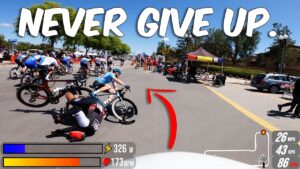Let’s talk about NCL (Denver Pro Men) | NorCal Cycling
Source: NorCal Cycling Youtube Channel: Let’s talk about NCL (Denver Pro Men)
Video Let’s talk about NCL (Denver Pro Men) with NorCal Cycling
Video Let’s talk about NCL (Denver Pro Men) with NorCal Cycling YouTube Channel.
Let’s talk about NCL (Denver Pro Men)
NorCal Cycling: A Breakdown of the National Cycling League
The National Cycling League (NCL) is making waves in the world of professional cycling, aiming to do for professional cycling what the NFL does for professional football or what the NBA does for professional basketball. It’s trying to standardize and formalize a league of professional crit racing here in the United States, and it’s off to a strong start with a one million dollar prize purse in their debut season. NorCal Cycling had the opportunity to experience the NCL firsthand at the Denver event, and is here to provide an in-depth look at the good, the bad, and the ugly of the NCL from a participant’s point of view.
Gridding and Qualifications: How the NCL Does It Differently
One of the first aspects of the NCL that caught NorCal Cycling’s attention was the gridding system based on qualification results. The qualifications, which took place the day before the race on a stationary bike, left NorCal Cycling feeling underwhelmed. The process felt inconsequential and didn’t reflect the full range of skills and abilities required for crit racing. However, the gridding system was utilized to set teams off into a grid for the race, creating an interesting dynamic.
Format and Point System: A NCL Race Unlike Any Other
The format of the NCL race was unique, with 10 teams and six riders per team. The race was equally split between men’s and women’s races, with points awarded per lap. This point system was refreshing and exciting for fans and racers, providing a cumulative score over the entire hour-long race. The NCL is contributing to gender equity in racing by prioritizing both men’s and women’s teams equally.
Level of Racing and Substitutions: The Strengths and Weaknesses
The NCL’s commitment to promoting high-level racing was evident, with the presence of NCL teams and riders like former World Tour pros, creating an intense and competitive field. However, NorCal Cycling highlighted the challenges posed by the substitution process. While the concept was promising, the execution left much to be desired. NorCal Cycling suggested improvements, such as implementing a sensor-based gate system or a screen that signifies when a team is allowed to make a substitution. These changes could turn substitutions into a strategic aspect of the race rather than a confusing and haphazard process.
The Future of NCL: Building a Spectacle in Cycling
Despite the challenges and areas for improvement, NorCal Cycling expressed optimism about the future of the NCL. The league has the potential to become the pinnacle of crit racing, offering an exciting and coveted opportunity for aspiring racers. Additionally, the NCL’s approach to working with other race promoters demonstrates a commitment to the overall growth and success of the sport. With continued support and refinements, the NCL has the potential to become a game-changer in the world of professional cycling.
In conclusion, the NCL is a promising addition to the landscape of professional cycling, with a vision to elevate and standardize crit racing in the United States. The league’s inaugural season showcased both its strengths and areas for improvement, providing a platform for racers, fans, and the broader cycling community to come together. As the NCL continues to evolve and refine its approach, it has the opportunity to become a significant force in the world of cycling, creating a spectacle that captivates audiences and inspires the next generation of racers.
The opinions expressed in this space are the sole responsibility of the YouTube Channel NorCal Cycling and do not necessarily represent the views of CicloNews.










